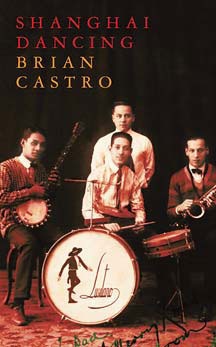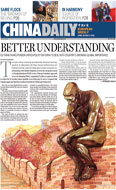Books
A journey from a Macao ferry to kangaroos and back
Updated: 2011-04-29 07:58
By Stuart Beaton (China Daily)
Brian Castro was born during a typhoon in 1950, on a ferry between Hong Kong and Macao, to a Portuguese father and a Chinese mother. At 11, he was sent to a boarding school in Sydney and because his father's Hong Kong business went bankrupt, he spent holidays herding sheep and mending fences with families of his country classmates.
While talking about his connections with the country in The Bookworm in Beijing, Castro, one of the guest authors in the Australian Writers' Week Festival in March, pointed among the crowded and overflowing bookshelves to a group of novels by James Joyce.
"He's the author I'd most like to have read my books", he said with a smile.
Joyce's work played a large role in Castro's critically acclaimed Shanghai Dancing, he says.
|
Brian Castro's award-winning novel Shanghai Dancing. Provided to China Daily |
"I made Dublin into Shanghai. Joyce was unique in that he was in Trieste, and he never went back to Dublin to look up these streets or get the atmosphere, he just asked friends, 'What's that pub there?', or 'Was it like that?' just to get the accuracy.
"I did the same with my father's Shanghai, I could never get inside his mind or discover the Shanghai of the 30s. I was lost - but in order to get the flavor of that time, I needed to return to the canon, and the canon was high modernism. So I made it post-modern high modernism, and in a way flippant and playful."
Now the chair of creative writing at Adelaide University, Castro started his journey into writing "in the most difficult way possible".
"I was a school teacher, teaching French verbs, and I simply walked out. I said, 'I can't do this for the rest of my life.'"
After quitting his job and being given some money by his dying mother, Castro spent two years putting together a novel about Chinese traveling to the Australian gold rush of the 1850s, which, although not a commercial success, went on to win the Australian/Vogel Literary Award.
Since then he has written eight other novels, including the multi-award-winning Double-Wolf and Shanghai Dancing and a volume of essays on writing and culture.
His latest book, The Bath Fugues, is three interwoven novellas centered on an aging art forger, a Portuguese judge, poet and art collector who is also an opium addict, and a doctor who has built an art gallery in tropical Queensland.
"The middle one is actually a historical character, a Portuguese poet who lived in Macao in the 1920s. He was a lawyer who'd come to Macao to lay down Portuguese law among the Chinese people.
"However, I didn't want to write a fictional biography of this person, so I gave him a different name, and I simply said, 'ok, the two other stories will uphold what he's trying to do - and that is the idea that the Chinese way of education is copying.'"
Earlier this year Shanghai Dancing was translated into Chinese by Professor Wang Guanglin, director of the Australian Studies Center at the Shanghai Institute of Foreign Trade, as part of the Australian Literary Translation Project.
China Daily
E-paper

Head on
Chinese household care goods producers eye big cities, once stronghold of multinational players
Carving out a spot
Back onto center stage
The Chinese recipe
Specials

British Royal Wedding
Britain's Prince William and his girlfriend Kate Middleton get married on April 29.

Costly dream
Uninhabited havens up for lease but potential customers face wave of challenges in developing them.

Models gear up car sales
Beauty helps steer buyers as market accelerates.

